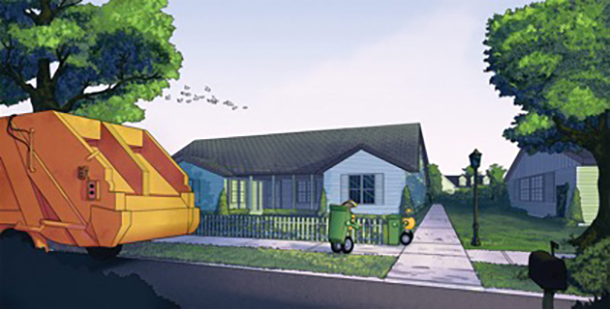
Illustration: Adrian Wirén/Mälardalens Högskola. Download this image: Volvo Group image gallery
Penn State researchers help develop robot-based refuse collection
09/21/2015
UNIVERSITY PARK, Pa. – One day soon, thanks to a team of researchers that includes Penn State students and faculty, a robot a lot like Pixar’s memorable Wall-E could arrive on your street and empty your refuse bins while you sleep.
It’ll be done without waking the sleeping families and without heavy lifting for the refuse truck’s driver. This is the purpose of ROAR (Robot-based Autonomous Refuse handling), a joint project with the aim to develop tomorrow's smart transport solutions.
The Volvo Group is currently working on a joint venture together with Penn State, two universities in Sweden and a Swedish waste recycling company, to develop a robot that interacts with the refuse truck and its driver to accomplish the work.
The goal of ROAR is to introduce a robot that, with the help of instructions from a truck’s operating system, can collect refuse bins in a neighborhood, bring them to a refuse truck and empty them. All of this occurs under the supervision of the refuse truck’s driver, who can thereby avoid heavy lifting.
The purpose of ROAR is to demonstrate how we, in the very near future, will use smart machines to assist with a broad range of activities in society. This technology can be applied in many areas. Refuse collection is just one example.
“Within Volvo Group we foresee a future with more automation,” said Per-Lage Götvall, project leader for the Volvo Group. “This project provides a way to stretch the imagination and test new concepts to shape transport solutions for tomorrow.”
Penn State and Sweden’s Mälardalens University and Chalmers University are part of Volvo Group’s Academic Partner Program, a network of twelve academic partners collaborating with Volvo for long-term cooperation in research and recruitment.
The students involved in this ground-breaking effort have different tasks and roles.
Students at Penn State´s Thomas D. Larson Pennsylvania Transportation Institute are developing the graphics, communication systems and control panel for the truck driver.
“We’re very lucky to have an amazing cohort of students who are well trained in automation technologies,” said Sean Brennan, associate professor of mechanical engineering and lead of the Penn State team. “This project promises great opportunities for our students to not only engage with a cutting-edge vehicle project, but also to help define how society will interact daily with robotic systems.”
Mälardalens University will design the robot.
“It is exciting that we are combining advanced research with our training in robotics,” said Mikael Ekström, project leader at Mälardalens University. ”Many students will work on this project, and it is a huge opportunity for them to learn both the technology and how to work in teams and in a real industrial context.”
At Chalmers University, students will work on the overall operating system.
“Chalmers has for many years developed the technology for the control and coordination of autonomous systems,” said Petter Falkman, associate professor of automation at Chalmers, “and we see that we can deal with problems of the complex type that waste handling entails. This will be a fun and challenging project for our driven researchers and motivated students.”
This work will continue until June 2016, when the technology will be tested on a vehicle developed by the Swedish recycling firm, Renova Environment.
“For many years Renova has been a leader in the development of vehicle technology dedicated to fostering a better environment and work environment,” said Hans Zackrisson, logistics development manager at Renova. “This project shows the exciting possibilities for the future.”
The Volvo Group is one of the world’s leading manufacturers of trucks, buses, construction equipment and marine and industrial engines. With production facilities in 19 countries, it is a publicly held company headquartered in Göteborg, Sweden.


